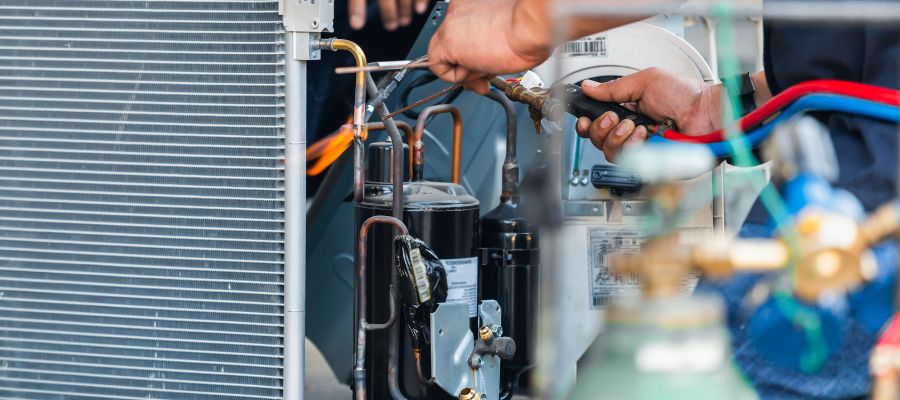

HVAC Services
Get Professional Repairs From The Area's Trusted HVAC Technicians. Ask About Our Services! We Offer Professional Heating & Cooling System Repairs And Guarantee Long-Lasting Results.
Got Question? Call us: (850) 678-2665Financing
A Comprehensive Guide to HVAC Repair: Ensuring Comfort and Efficiency

As your home’s first line of defense against extreme weather conditions, a well-maintained HVAC system is indispensable. Regular maintenance and timely repairs of your heating, ventilation, and air conditioning (HVAC) systems ensure your home remains comfortable throughout the year while also contributing to improved energy efficiency. In this comprehensive guide, we will delve into various aspects of HVAC repair and why it matters to every homeowner.
Understanding HVAC Systems
HVAC systems are integral components of our homes, providing heating, cooling, and ventilation to maintain indoor comfort. These systems consist of several parts, including a furnace, air conditioner, ductwork, and thermostat, each playing a crucial role in maintaining the ideal home environment.
Furnace
The furnace is one of the main components of an HVAC system. It heats air and distributes it throughout your home during colder months.
Air Conditioner
The air conditioning unit cools the air during hotter months, ensuring your home remains comfortable.
Heat Pump
A heat pump can both heat and cool a home, depending on the season. It’s an integral part of many HVAC systems.
Thermostat
The thermostat controls the temperature in your home, allowing you to set your preferred temperature.
Ductwork
Ductwork serves as the passage for heated or cooled air to travel throughout your home.
Air Filters
Air filters trap dust, pollen, and other airborne particles, contributing to good indoor air quality.
Common HVAC Problems and the Importance of Regular Maintenance
Regular HVAC maintenance can help you avoid several common issues such as thermostat problems, refrigerant leaks, and dirty filters, which could lead to more severe complications if left unchecked. HVAC technicians or contractors often recommend preventative maintenance, which includes regular inspections and tune-ups to ensure your HVAC system runs efficiently. This process includes checking HVAC parts and supplies, cleaning air filters, and ensuring proper airflow.
DIY vs. Professional HVAC Repair
While some homeowners may be tempted to carry out HVAC repairs themselves to save costs, it’s important to understand the risks involved in DIY repairs. HVAC systems are complex, and without the necessary training and understanding, you could inadvertently cause more damage. Simple tasks such as changing air filters or resetting breakers can be done by homeowners. However, for more complex issues like refrigerant leaks or system noise, it’s best to call a professional HVAC service.
When to Call a Professional
Knowing when to call a professional is essential. If your HVAC system is not heating or cooling effectively, making unusual noises, emitting strange odors, or causing a significant increase in your energy bills, it’s time to contact a professional. An HVAC technician can provide emergency HVAC service if required, ensuring your home returns to a comfortable state as soon as possible.
Cost Factors in HVAC Repair
Several factors influence HVAC repair costs. These include the type of repair required, the cost of parts, and the HVAC contractor’s fees. Additionally, residential HVAC repair may have different costs compared to commercial HVAC repair. When considering repair vs. replacement, understand that a newer, more efficient unit could lead to savings in the long term despite the higher upfront costs.
Choosing a Reliable HVAC Repair Service
When choosing an HVAC repair service, look for experienced, licensed technicians with good reviews. Ask about their experience with your specific HVAC brands and whether they offer warranties on their work. Having a reliable HVAC repair service ensures you get the best possible care for your system.
Energy Efficiency and HVAC Systems
Energy efficiency is a key consideration for any homeowner. An efficient HVAC system not only helps reduce your energy bills but also contributes to a more sustainable environment. Regular HVAC maintenance, timely repairs, and understanding your system’s efficiency ratings can significantly contribute to your home’s overall energy efficiency.
Indoor Air Quality
Your HVAC system plays a crucial role in maintaining good indoor air quality. A well-maintained system with clean air filters can effectively remove pollutants from the air, leading to healthier indoor environments. Poor indoor air quality can be a result of neglected HVAC maintenance and can lead to various health issues.
Emergencies and HVAC Repairs
HVAC emergencies require immediate attention. This could include a complete system failure in extreme weather or significant leaks causing water damage. In such cases, 24-hour HVAC repair services are invaluable.
The Future of HVAC Systems
The future of HVAC systems looks promising with advancements in technology leading to more efficient, smarter systems. From automated systems to more stringent energy standards, homeowners can expect better comfort and efficiency in the coming years.
Conclusion
The importance of regular HVAC maintenance and timely repair cannot be overstated. It ensures comfort, improves air quality, boosts energy efficiency, and extends the lifespan of your HVAC system. By understanding your HVAC system and knowing when to call a professional, you can ensure your home remains a comfortable sanctuary all year round.
Related Articles:
General HVAC Repair and Services Ultimate Guide
HVAC Repair Locations Ultimate Guide
Specific HVAC Equipment Repair Ultimate Guide
HVAC Repair Costs Ultimate Guide
HVAC Emergency and Timely Services Ultimate Guide
HVAC Quality and Reviews Ultimate Guide
HVAC DIY and Maintenance Ultimate Guide
HVAC Energy Efficiency Ultimate Guide
HVAC Indoor Air Quality Ultimate Guide
Heating And Cooling Systems Ultimate Guide

